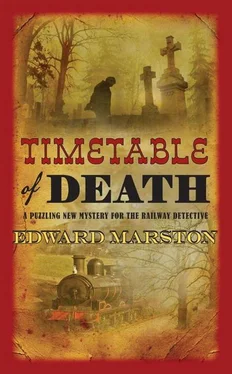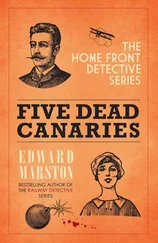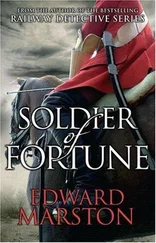Edward Marston - Timetable of Death
Здесь есть возможность читать онлайн «Edward Marston - Timetable of Death» весь текст электронной книги совершенно бесплатно (целиком полную версию без сокращений). В некоторых случаях можно слушать аудио, скачать через торрент в формате fb2 и присутствует краткое содержание. Год выпуска: 2015, ISBN: 2015, Издательство: ALLISON & BUSBY, Жанр: Исторический детектив, на английском языке. Описание произведения, (предисловие) а так же отзывы посетителей доступны на портале библиотеки ЛибКат.
- Название:Timetable of Death
- Автор:
- Издательство:ALLISON & BUSBY
- Жанр:
- Год:2015
- ISBN:9780749018122
- Рейтинг книги:4 / 5. Голосов: 1
-
Избранное:Добавить в избранное
- Отзывы:
-
Ваша оценка:
- 80
- 1
- 2
- 3
- 4
- 5
Timetable of Death: краткое содержание, описание и аннотация
Предлагаем к чтению аннотацию, описание, краткое содержание или предисловие (зависит от того, что написал сам автор книги «Timetable of Death»). Если вы не нашли необходимую информацию о книге — напишите в комментариях, мы постараемся отыскать её.
Timetable of Death — читать онлайн бесплатно полную книгу (весь текст) целиком
Ниже представлен текст книги, разбитый по страницам. Система сохранения места последней прочитанной страницы, позволяет с удобством читать онлайн бесплатно книгу «Timetable of Death», без необходимости каждый раз заново искать на чём Вы остановились. Поставьте закладку, и сможете в любой момент перейти на страницу, на которой закончили чтение.
Интервал:
Закладка:
‘Are you sure?’
‘He told me he was going for good.’
‘Was that before or after he was beaten up?’
Cleary was surprised. ‘You know about that?’ he asked, replacing his cap.
‘I’ve spoken to him twice.’
‘What happened to him was bad. Gerard could hardly walk.’
‘Did that make you look at Mr Quayle in a different way?’
‘I do what I’m paid to do,’ said Cleary, levelly.
Colbeck studied him. He could see why the coachman had befriended the gardener. Apart from cricket, they had much in common. They were younger than most of the servants and had positions that they cherished. In his mind’s eye, Colbeck could see them slipping off to a local inn together after the day’s work was done.
‘Did he ever talk to you about Miss Lydia Quayle?’
Cleary was emphatic. ‘No — it was none of my business.’
‘Were you shocked when the truth came out?’
‘We all were, Inspector.’
‘Did it cause a lot of upset here?’
‘Yes, it did. But that’s all in the past.’
‘The murder of Mr Quayle has brought it alive again,’ said Colbeck, ‘because Mr Burns is bound to be viewed as someone with a strong motive to kill his former employer.’ Cleary shook his head violently. ‘You disagree?’
‘Gerard would never do such a thing, sir.’
‘Have you seen him since he moved away from here?’
‘Only once — but I don’t need to see him. I know him. He’s not a killer.’
‘People can change, Mr Cleary.’
‘Our sort stay the same,’ said the other, steadfastly.
His identification with the gardener was complete. Cleary and Burns were kindred spirits. The coachman refused to believe that his friend was capable of murder. While he admired the man’s loyalty, Colbeck doubted his judgement.
‘Did Mr Quayle ever stay away from home?’ he asked.
‘Yes, sir — he often went to London on business.’
‘Where else did he go?’
‘I don’t know. All I was told was when he was coming back.’
‘Let me ask you a final question, Mr Cleary,’ he said, ‘and I want you to take all the time you need before answering it. On the day of the murder, you took Mr Quayle to the railway station at the usual time. Presumably, he caught the usual train but you are in no position to confirm that. Was there anything — anything at all — that was different that day? Did Mr Quayle say or do anything out of the ordinary? Now, please — think carefully.’
The coachman needed only a few seconds to recall something unusual.
‘I could be wrong, of course,’ he warned.
‘What do you remember?’
‘Well, Mr Quayle took very little notice of me as a rule. When he got out of the carriage, he just muttered his thanks.’
‘Was there something different on the last day you saw him?’
‘Yes,’ replied Cleary, ‘there was. He didn’t say a single word to me at the railway station and … I had a feeling that he’d been crying.’
CHAPTER EIGHTEEN
As the wheel of the cab hit another deep pothole, Edward Tallis cursed the fact that Melbourne did not have its own railway station. The drive to the village was an ordeal of bumping, jerking, twisting and sudden lurches that threw him against the side of the vehicle. Every possible hazard in the road seemed to have been explored, leaving the passenger with unwelcome bruises. It was almost as if the driver had set out to injure Tallis. When he finally reached the Hall, he paid the man his fare and left a series of stinging complaints in lieu of a tip. Having introduced himself to the housekeeper, he asked to see Burns in his own domain. The gardener was poring over a catalogue when Tallis appeared. He scrambled to his feet.
The housekeeper introduced the visitor then left them alone.
‘Can I help you, sir?’ asked the gardener.
‘I believe that you’ve met my colleague, Inspector Colbeck.’
‘I spoke to him a few hours ago. There’s nothing else I wish to add.’
‘ My wishes are paramount here, Burns. I require your attention.’
Burns sighed and put the catalogue aside. He indicated the bench and they both sat down. During his career in the army, Tallis had dealt with a large number of men and developed a knack of summing up a person’s character at a glance. Burns might seem polite and open-faced but the superintendent saw a hint of the unspoken insolence that broke out in the ranks from time to time and on which he’d always stamped firmly. In his opinion, the gardener looked as if he might have a mutinous streak.
‘How long have you worked here, Burns?’
‘Does it matter?’
‘I’ll ask the questions.’
‘Then talk to the inspector before you ask the same things he did. He’ll tell you my history. There’s no point in going through it again. I was honest with him about my setbacks. I’m much happier with my lot now.’
‘Is your happiness connected with the death of Vivian Quayle?’
Burns was jolted. ‘That did give me pleasure,’ he said, slowly.
‘It must have been a cause for celebration.’
‘I’m too busy here to think about such things, sir.’
‘The inspector told me about the weedkiller you use.’
‘I’m not the only gardener who’s experimented with it. I could name two or three. When I worked for Mr Quayle, I used a similar preparation on weeds. Perhaps you should be talking to the head gardener there.’
‘There’s no need for flippancy.’
‘Then I apologise.’
Tallis gazed around. The gardens were spectacular and the man in charge of them was clearly knowledgeable. It seemed unlikely that he’d desert his post to plot the murder of an old enemy. Yet he had a strong motive, access to one of the poisons found in the dead man and was known to have been close to Spondon on the night in question. Added to that was the calculated stubbornness he was now displaying.
‘I’m told that you’re a fine cricketer,’ said Tallis.
‘I used to be.’
‘Did you never wish to play for the All-England team?’
‘Gardening always came first.’
‘But you were encouraged to play the game when you were in Mr Quayle’s employ. It seems that your bowling was the crucial ingredient of the team’s success. You must miss the chance to play to such a high standard.’
‘There are compensations, sir.’
‘In your position, I’d resent the man that took that chance away from me.’
‘I still play cricket now and then,’ said Burns, arrogance showing through, ‘and Mr Quayle had more cause for resentment than me. Since I left, his team haven’t won a single game.’
‘How do you know that?’
‘Gossip travels.’
‘I thought you’d lost all interest in what happens on his estate.’
‘I can’t help it if I hear rumours, Superintendent.’
Tallis removed his top hat carefully and used a handkerchief to dab at the light perspiration on his brow. His next question came without warning.
‘You’re hiding something, aren’t you?’ he challenged.
‘No, sir, I’m not.’
‘You’re hiding the fact that you’ve kept in touch with your old place of work so that you could be aware of the movements of the man you hated. You’ve been biding your time, Burns, haven’t you?’
‘I’ve not seen Mr Quayle since the day I left.’
‘You didn’t need to if you had a confederate who still worked there.’
‘But I don’t.’
‘We only have your word for it.’
‘I’m telling the truth.’
‘It doesn’t sound like it to me — or to Inspector Colbeck, for that matter.’
Burns was angry. ‘What has he been saying about me?’
‘He thought that you couldn’t be trusted. I’m inclined to agree. It was his suggestion that you might have someone working on Mr Quayle’s estate who reported back to you.’
Читать дальшеИнтервал:
Закладка:
Похожие книги на «Timetable of Death»
Представляем Вашему вниманию похожие книги на «Timetable of Death» списком для выбора. Мы отобрали схожую по названию и смыслу литературу в надежде предоставить читателям больше вариантов отыскать новые, интересные, ещё непрочитанные произведения.
Обсуждение, отзывы о книге «Timetable of Death» и просто собственные мнения читателей. Оставьте ваши комментарии, напишите, что Вы думаете о произведении, его смысле или главных героях. Укажите что конкретно понравилось, а что нет, и почему Вы так считаете.












